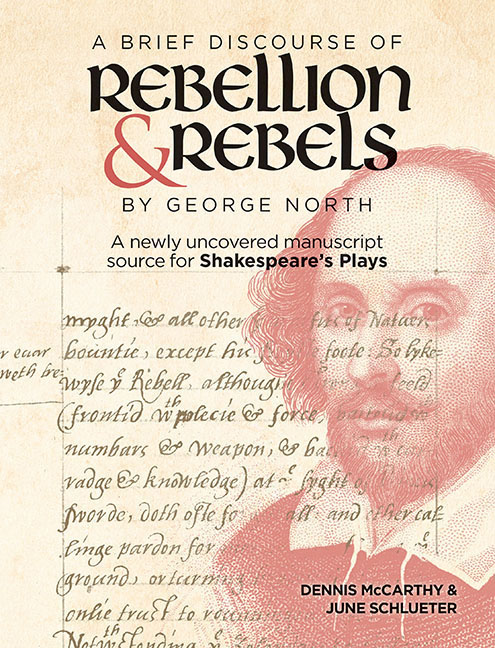 'A Brief Discourse of Rebellion and Rebels' by George North
'A Brief Discourse of Rebellion and Rebels' by George North Book contents
- Frontmatter
- Contents
- Acknowledgments
- 1 George North and the Kirtling Hall Manuscript
- 2 Uncovering Connections Between North's “Discourse” and Shakespeare's Plays
- 3 The Final Hours of Jack Cade
- 4 The Fool, Merlin's Prophecy, and the Upside-Down World of King Lear
- 5 Political Monologues and a Glimpse of Coriolanus
- Afterword: The Odds That the Parallels Are Coincidental
- The Transcript: “A Brief Discourse of Rebellion and Rebels,”, by George North
- Facsimile: “A brief discourse of rebellion and Rebells, wher'in isshowyd, ye treasur yt Traytors in yye execution of theyr treason, by tym attayne to,” by George North
- Index
3 - The Final Hours of Jack Cade
Published online by Cambridge University Press: 09 October 2019
- Frontmatter
- Contents
- Acknowledgments
- 1 George North and the Kirtling Hall Manuscript
- 2 Uncovering Connections Between North's “Discourse” and Shakespeare's Plays
- 3 The Final Hours of Jack Cade
- 4 The Fool, Merlin's Prophecy, and the Upside-Down World of King Lear
- 5 Political Monologues and a Glimpse of Coriolanus
- Afterword: The Odds That the Parallels Are Coincidental
- The Transcript: “A Brief Discourse of Rebellion and Rebels,”, by George North
- Facsimile: “A brief discourse of rebellion and Rebells, wher'in isshowyd, ye treasur yt Traytors in yye execution of theyr treason, by tym attayne to,” by George North
- Index
Summary
One of the more exciting results to issue from our mining of George North's “A Brief Discourse of Rebellion and Rebels” is that the manuscript reveals the origin of the much-debated circumstances surrounding the final hours of Jack Cade, the rebel who, in 1450, claimed Edmund Mortimer as ancestor and asserted his right to the crown. In Shakespeare's 2 Henry VI, Cade leads a vigorous citizens’ revolt only to die at the hand of Alexander Iden. The Chronicles of Hall and Holinshed were clearly Shakespeare's primary source for the English histories, but there are details concerning Cade's death that do not appear in either – or, for that matter, in Caxton, Fabyan, Christopherson, Baldwin, Foxe, Stow, or Grafton. These include Cade's repentant monologue detailing his suffering as well as peculiar features describing his final hours: the weather is very hot, he is hiding fearfully until starvation compels him to trespass into Iden's garden, his limbs are emaciated, he eats grass to sustain himself, and he dies because he is too famished to fight effectively. Iden intends to drag Cade's body along the streets by the heels and leave his corpse to be eaten by crows. No other account of Cade's final hours includes any of these circumstances; indeed, scholars credit Shakespeare with having invented them. But the manuscript reveals that Shakespeare had a source.
Although nearly all of North's “Discourse” is in prose, the treatise contains poems on the three notorious rebels: Jack Cade, Owen Glendower, and the Black Smith. North fashioned each poem as a memoir-confession by the rebel's remorseful ghost, clearly drawing inspiration from William Baldwin's Mirror for Magistrates (1575), which contains similarly styled poetic monologues by these and other historical figures. North occasionally borrowed stanzas from Mirror for Magistrates, but, importantly, he did a fair amount of rewriting and added details that, some years later, ended up in Shakespeare's plays.
The regretful monologues in “Discourse” are best described as end-of-life laments, and, importantly, North intertwined them, introducing all three in the same paragraph. Baldwin's work, in contrast, deals with a variety of historical events involving the fall of princes and includes material on Richard II, Lord Clifford, Henry VI, and Edward IV. Thus, in Mirror for Magistrates, the poems on Glendower, Cade, and the Black Smith appear in three widely separated chapters, beginning on folios 19, 43v, and 144, respectively.
- Type
- Chapter
- Information
- 'A Brief Discourse of Rebellion and Rebels' by George NorthA Newly Uncovered Manuscript Source For Shakespeare's Plays, pp. 28 - 51Publisher: Boydell & BrewerPrint publication year: 2018


